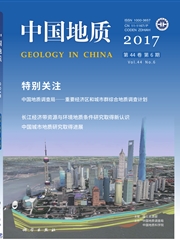

 中文摘要:
中文摘要:
梅山铁矿床位于长江中下游成矿带宁芜盆地北段,矿体赋存于辉长闪长玢岩和下白垩统大王山组辉石安山岩的接触带。研究表明,梅山铁矿的石榴石以钙铁榴石为主,为钙铁-钙铝榴石系列,与传统意义矽卡岩矿床的石榴石组成相似;磁铁矿和赤铁矿具有斑岩铜矿和Kiruna型矿床的双重特征;赤铁矿和菱铁矿显示热液交代成因特征,但赤铁矿至少有2个成矿世代。成矿母岩辉长闪长玢岩、磁铁矿及磷灰石具有相似的稀土配分模式,暗示三者具有同源性。辉长闪长玢岩无Eu异常,代表了高氧逸度下岩浆的分离结晶作用;磁铁矿和磷灰石均具有中度负Eu异常,可能是在辉长闪长玢岩发生钠长石化的过程中,Eu以Eu2+形式在钠长石内富集,造成流体Eu亏损,后来生成的磷灰石和磁铁矿继承了流体的Eu含量特征,辉长闪长玢岩的钠长石化导致富Fe2+硅酸盐矿物淋滤铁元素进入流体,为矿床提供了铁物质。
 英文摘要:
英文摘要:
The Meishan iron deposit is located in the northern Ningwu Basin of the Middle-Lower Yangtze River metallogenic belt, and occurs at the contact zone between the gabbro-diorite porphyry and the pyroxene andesite of the Late Cretaceous Dawangshan Formation. The garnets of the Meishan iron deposit are similar to those of skam deposits in end member, classified as andradite- grossular series. Magnetite and hematite display the characteristics of both Kiruna-type and porphyry copper deposits. Hematite and siderite were formed by hydrothermal fluids, and the hematite has at least two types. Gabbro-diorite porphyry (host rocks), magnetite and apatite share similar chondrite-normalized REE distribution patterns, indicating the same source. Nevertheless, the gabbro-diorite porphyry fails to show Eu anomalies and possibly resulted from magmatic fractional crystallization with high oxygen fugacity. Negative Eu anomalies of magnetites and apatites might have resulted from the enrichment of Eu^2+ in the albites during the process of albitization. Iron was extracted from Fe^2+-rich silicate minerals and migrated into the ore-forming fluid due to albitization of the gabbro-diorite porphyry.
 同期刊论文项目
同期刊论文项目
 同项目期刊论文
同项目期刊论文
 期刊信息
期刊信息
